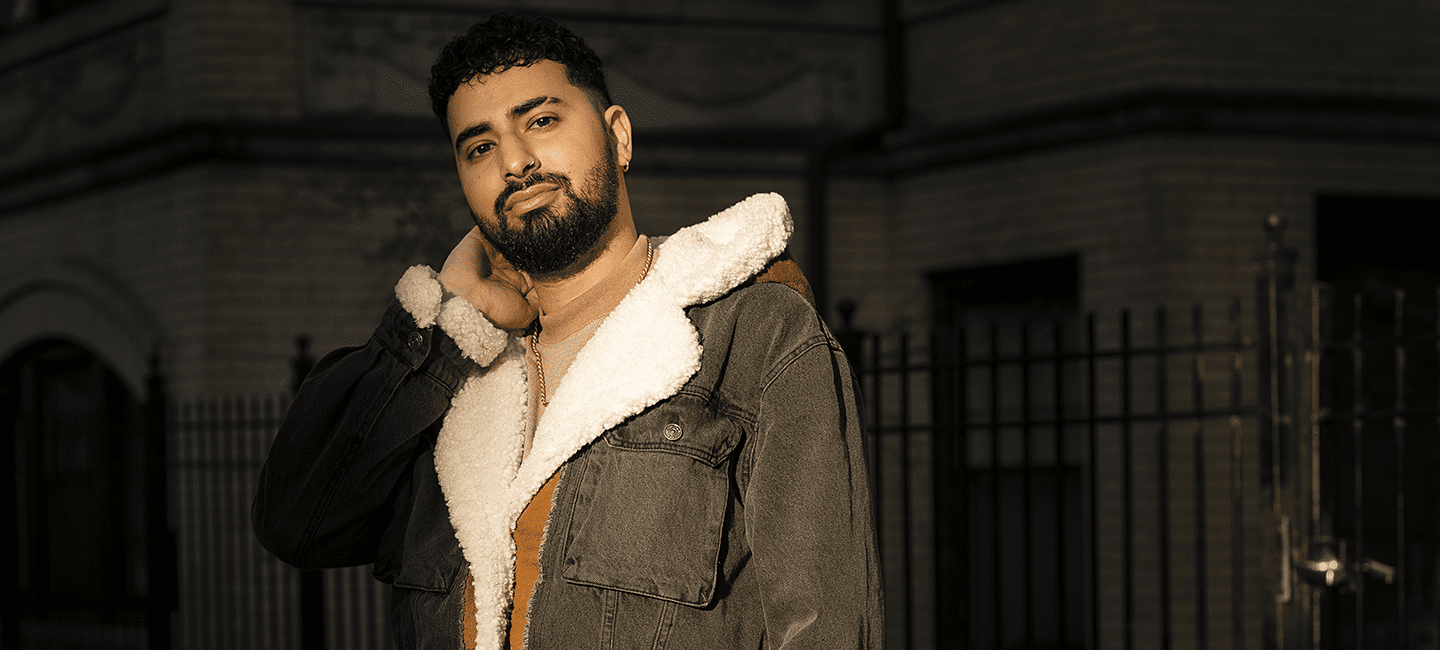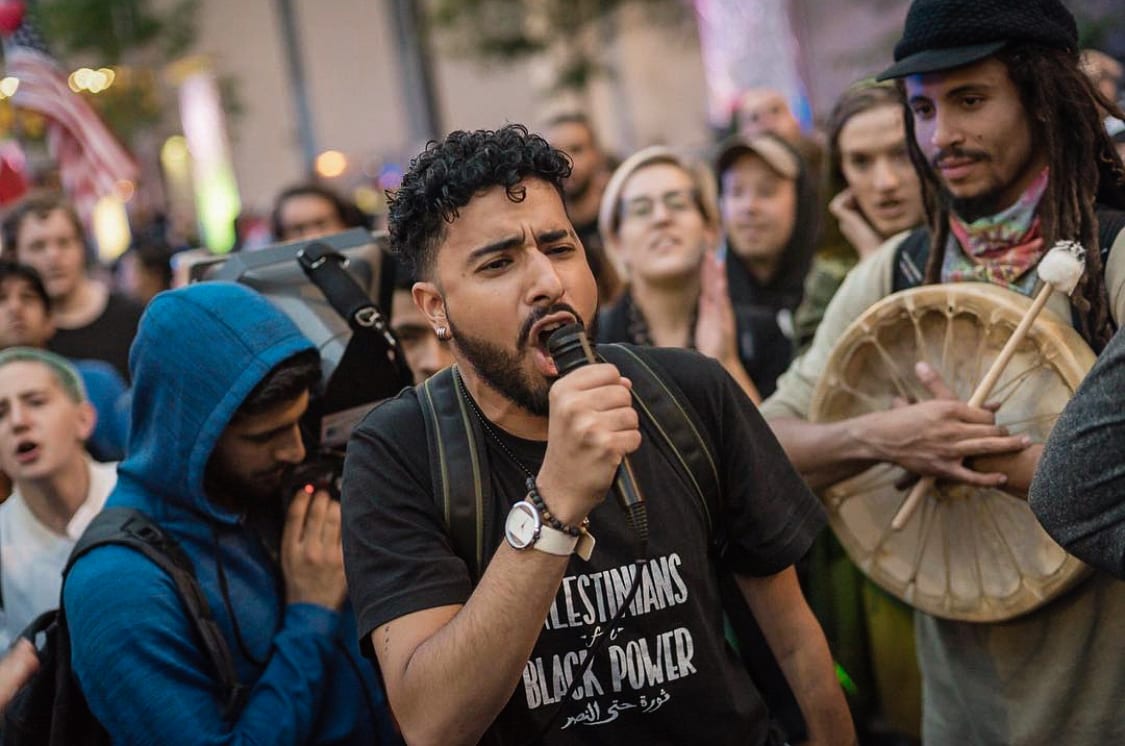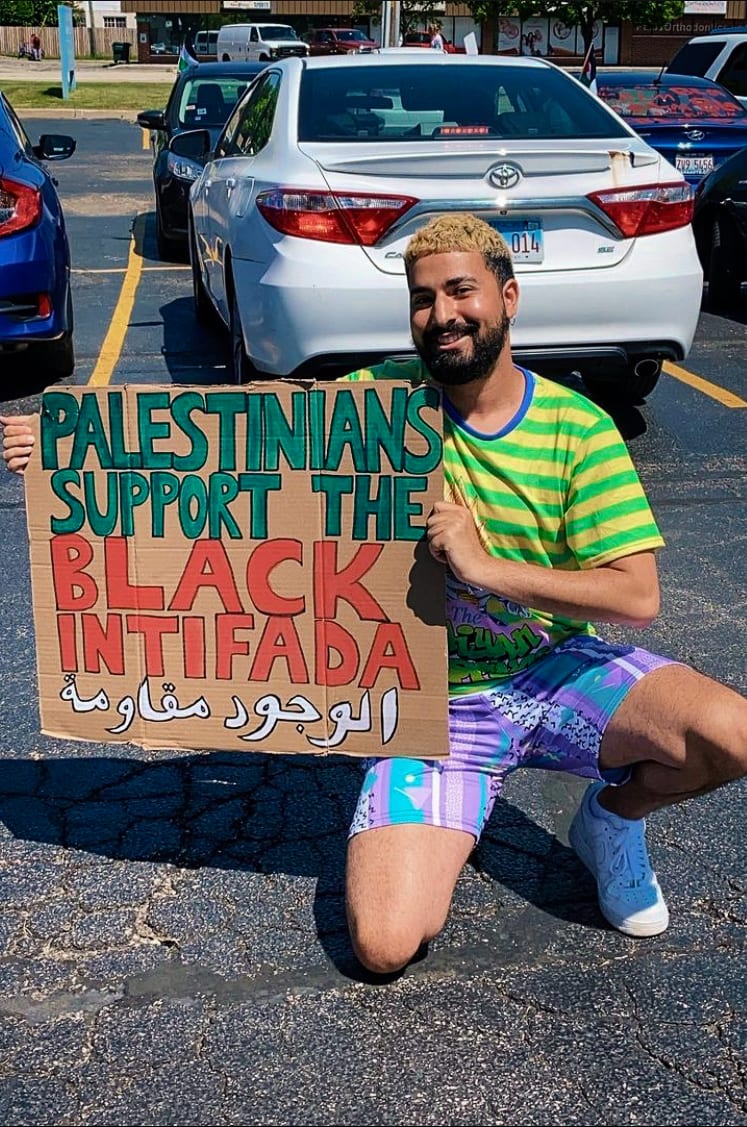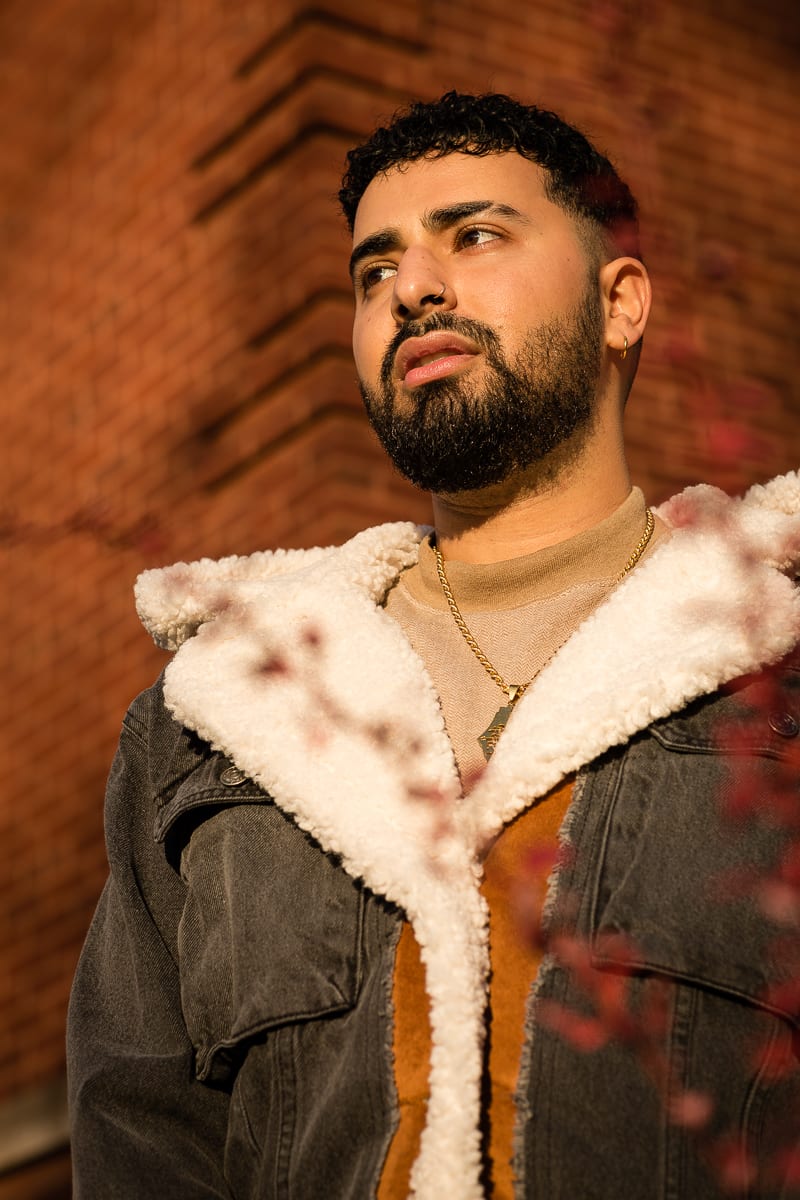 Fotografía de Michelle Kanaar
Fotografía de Michelle KanaarEl organizador homosexual Samer Owaida habla de cómo vincular las luchas mundiales contra la opresión a los movimientos locales por el cambio.
Cuando Samer Owaida abandonó Palestina en 2001, le separaban de su familia más de 10.000 kilómetros. Entonces sólo tenía cinco años. Él, su madre y su hermana abandonaron su hogar durante la Segunda Intifada, cuando más de 4.000 personas fueron asesinadas.
Noticias que ponen el poder en el punto de mira y a las comunidades en el centro.
Suscríbase a nuestro boletín gratuito y reciba actualizaciones dos veces por semana.
Organizadora de larga trayectoria que ha colaborado con diversas organizaciones de justicia social como Black Lives Matter Chicago y AnakbayanOwaida vivía en Pequeña Palestina desde hace más de una década. El tramo de los suburbios del suroeste de Chicago es probable hogar a más inmigrantes palestinos que en ningún otro lugar de EE.UU. Pero se marchó el año pasado: Fue difícil encontrar un sentido de pertenencia en una comunidad árabe que a menudo reprueba la homosexualidad.
En la actualidad, Owaida organiza con el Movimiento Juvenil Palestinoun colectivo de jóvenes palestinos y árabes que buscan un papel activo en la liberación de Palestina de la ocupación sionista y subrayan la lucha conjunta entre todos los pueblos oprimidos e indígenas. En la Universidad de Illinois en Chicago, también investiga las estructuras que informan a los hombres árabes homosexuales y bisexuales sobre el VIH. Está aprendiendo rápidamente que la organización comunitaria a menudo implica mantener conversaciones difíciles con personas que tienen visiones del mundo y valores diferentes.
He tenido que autocensurarme, sobre todo al principio. Desgraciadamente, mi comunidad no está en una situación en la que pueda manejar la homosexualidad.
Me mudé de la Pequeña Palestina por lo tóxica que se volvió. Mi primer trabajo fue en una organización árabe sin ánimo de lucro. Fue justo cuando me perforé las orejas. Recuerdo que algunos días llegaba al trabajo y las mujeres se me quedaban mirando y cuchicheaban. A veces, una compañera se me acercaba y me decía: "El cliente que acabo de tener, ¿sabes lo que me ha dicho? Dijo que Dios envió a los de tu clase aquí como una maldición".
Momentos como ese duelen mucho, en retrospectiva, porque no les hice nada para merecer su odio. Realmente estoy aquí intentando luchar por los palestinos. Pero no quiero menos a mi comunidad palestina más cercana. Los amo profundamente, y por eso sigo haciendo este trabajo.

Y ha habido cambios. Cuando fui a una protesta en los suburbios del suroeste de Chicago este verano, pude ver a tías y tíos coreando "Las vidas de los negros importan" en árabe. Fue genial. Es cierto que sólo eran tres o cuatro, pero esto no habría ocurrido hace diez, cinco o dos años. Está empezando. Es muy lento, pero lo estamos consiguiendo.
El cambio se produce mucho más despacio y de forma más complicada porque estás trabajando con seres humanos reales que creen estas cosas. Todas nuestras comunidades creen en la antinegritud porque es global e impregna todas las sociedades. No es cuestión de discrepar. Es cuestión de presionar a la gente para que lo haga, poco a poco.
Y esa es realmente la diferencia entre el activismo y la organización comunitaria. El activismo es individual por naturaleza. El activismo es salir y presentar el cambio que quieres ver en el mundo. La organización comunitaria, que es en lo que yo quería participar, no tiene que ver con el individuo. Y también es un poco más difícil de cooptar por el capitalismo.
El mayor reto -y triunfo- es tener que convivir con personas que tienen opiniones diferentes. En el caso de Palestina, tengo que organizarme con gente que cree en una solución de dos Estados o con gente que cree en dialogar con Israel. Tengo que trabajar con gente que puede pensar que los homosexuales no son humanos. Tengo que trabajar con personas que piensan que Palestina debe ser sólo para los musulmanes. Un activista no se relacionaría con esas personas.

Cuando la mierda estallaba este verano, me metía en muchas discusiones con mi madre. Ella es anti-negra de una manera que refuerza la opresión horizontal. Como mujer hijabi, ha sufrido el racismo de la gente negra, así que no puede ver más allá.
Ella dice: "No lo entiendo. Míranos. Vinimos a este país. Somos la minoría modelo. Fue duro para nosotros, pero lo hicimos". Y yo le digo: "Sí, mamá, lo hicimos porque no somos negros". Ella dice: "Vale, bien. Lo entiendo. Tienes razón".
Momentos después, ella dice: "Pero Obama se convirtió en presidente". Y yo le digo: "Vale, mamá, miremos a Palestina. Mira quién es nuestro presidente. Es un pedazo de mierda. ¿Significa eso que estamos liberados?"
"Vale, pero los saqueos", me dice. Y yo le digo: "No me hables de los putos saqueos, mamá, porque cuando se produjo la Intifada en Palestina, todos quemasteis tiendas israelíes. Lanzabais piedras".
La cogí de la mano por teléfono durante dos horas y media. Y sentí que había progresado un cinco por ciento.
La mayoría de la gente de mi comunidad -la mayoría de los inmigrantes que vienen de países devastados por la guerra- no entienden realmente la historia tan profunda y malvada de este país. Siempre me veo traduciendo a mis primos cómo se fundó Estados Unidos. Siéntense. Déjenme decirles. Lo que están haciendo aquí en Palestina es lo que hicieron en América en sus inicios. Llegaron a esta tierra. Mataron a los indígenas de esta tierra. Los pusieron en pequeños enclaves.
Y todo está conectado. El ejército estadounidense es la policía mundial, una policía que enviamos a otros países. El ICE es la policía que enviamos a los hogares de la gente. Y la policía es la policía que enviamos a los barrios de la gente.
Muchos musulmanes o árabes probablemente piensan que la cárcel es algo natural o normal. Es donde va la gente mala. Para los palestinos que no entienden la prisión en este país como un complejo industrial, vamos a traducirlo de una manera para que puedan hacerlo. Desde 1967, más de un millón de palestinos han sido encarcelados. Eso supone más del 40% de la población masculina palestina. Casi uno de cada dos hombres palestinos ha sido encarcelado. ¿Qué significa eso para nosotros?
Sí, la cara del enemigo cambió. Es Israel. Hicieron esto a nuestro pueblo, nos hicieron daño, entraron en nuestra tierra y la convirtieron de cielo en la tierra -uno de los lugares más bellos del mundo- a un lugar de bases militares y puestos de control y contaminación y putas cabezas nucleares. Lo han convertido en gris. Mira lo que nos han hecho.

¿Puedo hacer que empieces a pensar en cómo ocurrió eso también en esta tierra? Todos estamos luchando globalmente. La liberación es global e intercomunitaria.
Nunca podré ser feliz en esta vida mientras sepa que hay personas que sufren una opresión injusta en algún lugar, porque sé lo que se siente al no ser visto. Yo también pasé desapercibida, histórica y políticamente, como palestina. No quiero que nadie experimente eso nunca. Porque cuando pienso en un mundo liberado, no se limita a la frontera de Palestina.
Mi amiga Lamis, a quien considero una anciana en el movimiento palestino, me dijo que fuera más despacio. Le hablaba de la política de la conveniencia, de todo lo que me pasaba en la vida.
Me dice: "¿Por qué haces lo que haces? Necesitas encontrar eso.
"¿Lo haces porque echas de menos cómo huele Palestina? ¿Lo haces porque echas de menos a tu tía? Tienes que sentarte. Siéntate y respira y encuentra eso".
Y creo que aún no lo he encontrado.

